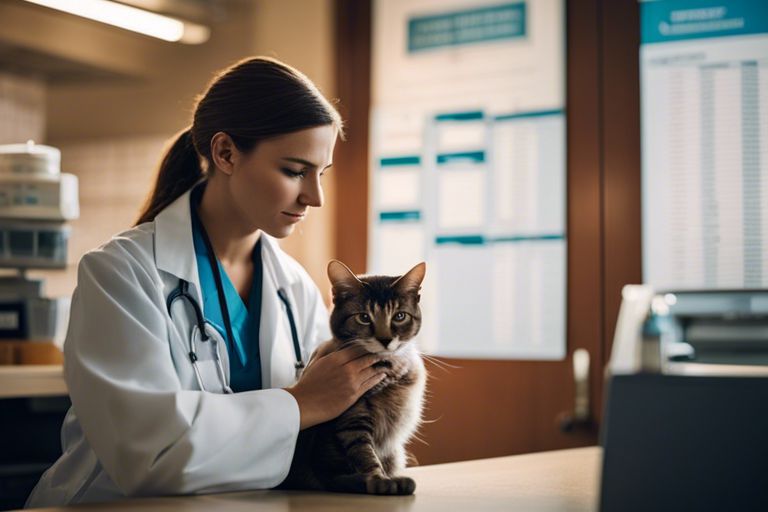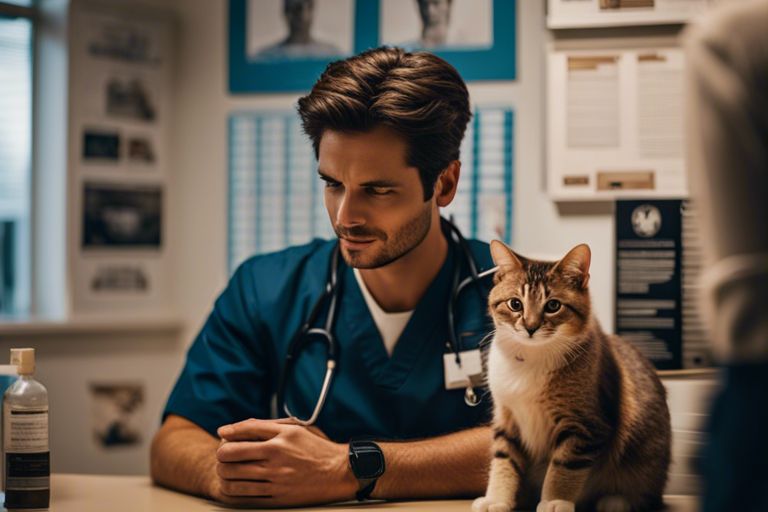Oftentimes, when we think of parvo, we think of dogs. However, it is important to recognize that cats can also be affected by parvo, a highly contagious and potentially deadly virus. In this blog post, we will explore the causes, signs, treatment, and prevention of parvo in cats, so that cat owners can be aware of the dangers and take the necessary steps to protect their feline companions. Understanding this information is vital in ensuring the health and well-being of our beloved pets, so let’s delve into the world of feline parvo.
Key Takeaways:
- Parvovirus can affect cats: Although parvo is commonly associated with dogs, cats can also be susceptible to the virus and can experience similar symptoms.
- Recognizing the signs of parvo in cats: Common symptoms of parvo in cats include lethargy, vomiting, diarrhea, and loss of appetite. It is important to seek veterinary care if you suspect your cat has parvo.
- Prevention and treatment: Proper vaccination and maintaining good hygiene can help prevent parvo in cats. If a cat is diagnosed with parvo, early and aggressive treatment by a veterinarian is crucial for their recovery.

Causes of Feline Parvovirus
Even though the exact cause of feline parvovirus, also known as feline panleukopenia, is not fully understood, it is believed to be primarily caused by a virus known as feline parvovirus (FPV). This highly contagious virus affects cats and other members of the feline family, including domestic cats, wild cats, and related species.
Transmission of the Virus
An infected cat can shed the virus in all body secretions, including urine, feces, saliva, and nasal discharge. The virus can be spread through direct contact with an infected cat or indirect contact with contaminated objects or environments. Cats can also become infected through the placenta if their mother is carrying the virus during pregnancy.
Risk Factors for Cats
Risk factors that increase the likelihood of a cat contracting the feline parvovirus include
- Unvaccinated cats
- Young kittens with immature immune systems
- Outdoor cats with higher exposure to infected animals and environments
Though the virus can affect cats of any age, sex, or breed, these factors can increase the risk of contracting the virus.
Parvovirus is a serious and potentially life-threatening disease that primarily affects the rapidly dividing cells in a cat’s body, particularly those in the bone marrow and intestinal tract. The virus can cause severe illness, leading to symptoms such as lethargy, loss of appetite, severe vomiting and diarrhea, and dehydration. It is crucial for cat owners to be aware of these risk factors and take preventive measures to protect their feline companions from this dangerous virus.

Signs and Diagnosis of Parvo in Cats
To accurately diagnose parvo in cats, it is important to recognize the signs and symptoms and conduct the appropriate diagnostic procedures. This ensures timely treatment and prevention of further spread of the virus.
Clinical Symptoms
The clinical symptoms of parvo in cats include vomiting, severe diarrhea, lethargy, loss of appetite, and dehydration. These symptoms can quickly worsen and become life-threatening if not addressed promptly. If you notice any of these signs in your cat, it is crucial to seek veterinary attention immediately.
Diagnostic Procedures
Clinical diagnosis of parvo in cats involves physical examination, blood tests, and fecal tests to confirm the presence of the virus. These tests are essential to accurately diagnose parvo and determine the appropriate course of treatment.
Any delay in diagnosis and treatment can lead to serious health complications and even death in cats. Therefore, it is imperative to consult with a veterinarian as soon as possible if parvo is suspected.

Treatment Options for Feline Parvovirus
After a cat has been diagnosed with feline parvovirus, it is crucial to begin treatment as soon as possible. Prompt and appropriate treatment can greatly increase the chances of a cat surviving the infection. It is important to work closely with a veterinarian to determine the best course of action for the individual cat. Feline parvovirus infection: recognition, treatment and …
Medical Interventions
The primary goal of medical interventions for feline parvovirus is to combat the virus and manage the symptoms. This may involve administering antiviral medications, anti-nausea medications, and fluids to prevent dehydration. Hospitalization may be necessary for more severe cases, as close monitoring and intensive care may be required.
The prognosis for cats with feline parvovirus is heavily dependent on the severity of the infection and the timeliness of medical interventions. Early intervention and supportive medical care can significantly improve the chances of recovery for affected cats.
Supportive Care and Management
For cats with feline parvovirus, supportive care and management play a critical role in their treatment. This includes providing a comfortable and stress-free environment, offering nutritional support, and addressing any secondary infections that may arise. Additionally, proper hygiene and sanitation are essential to prevent the spread of the virus to other cats in the household or community.
This comprehensive approach is vital for supporting the cat’s overall well-being and helping them overcome the challenges posed by feline parvovirus.
>Can Cats Get Parvo from Their Belly Button?
Yes, cats have belly buttons, but they cannot get parvo from them. Parvo is a viral disease that mainly affects dogs, not cats. Cats can have other health issues related to their belly buttons, but parvo is not one of them.
Prevention of Feline Parvovirus
Not only is feline parvovirus a serious and potentially fatal disease for cats, but it is also highly contagious. However, there are steps that can be taken to help prevent the spread of the virus and protect cats from becoming infected.
Vaccination and Immunity
Prevention of feline parvovirus begins with vaccination. Vaccination is the most effective way to protect cats from the disease. Kittens should receive their first vaccinations at around 6-8 weeks of age, with boosters given every few weeks until they are around 16 weeks old. Adult cats should also receive regular vaccinations to maintain their immunity.
Environmental Control and Hygiene
To help prevent the spread of feline parvovirus, it is important to maintain a clean and hygienic environment. Regular disinfection of cat areas and equipment is crucial in preventing the spread of the virus. Cats should be kept in a clean, well-ventilated environment to reduce the risk of exposure to the virus.
With proper environmental control and hygiene measures in place, the risk of feline parvovirus transmission can be greatly reduced. Regular cleaning and disinfection of litter boxes, food and water dishes, and bedding is essential in preventing the spread of the virus. Additionally, limiting contact with unknown or unvaccinated cats can help reduce the risk of exposure.
Conclusion
With these considerations in mind, it is important for cat owners to be aware of the potential risk of parvo in cats. While parvo is more commonly associated with dogs, cats can still be affected by the virus and it is important to recognize the signs and symptoms in order to seek appropriate treatment. Preventative measures such as vaccinations and good hygiene practices can help reduce the risk of parvo in cats. Early detection and prompt treatment are crucial in improving the chances of recovery for affected cats. By staying informed and taking proactive steps, cat owners can help protect their feline companions from the dangers of parvo.
FAQ
What is feline parvovirus (FPV) and can cats get parvo?
Feline parvovirus, also known as feline panleukopenia virus, is a highly contagious and potentially deadly virus that affects cats. Yes, cats can get parvo, and it is a serious concern for cat owners.
What are the causes of parvovirus in cats?
The primary cause of parvovirus in cats is direct contact with an infected cat or their bodily fluids, such as urine, feces, or saliva. The virus can also survive in the environment for an extended period, making it easy for cats to come into contact with it.
What are the signs of parvo in cats?
Common signs of feline parvovirus include lethargy, vomiting, diarrhea, fever, loss of appetite, and dehydration. In severe cases, cats may also experience neurological symptoms and may become weak or unable to stand.
How is parvovirus in cats treated?
There is no specific antiviral treatment for feline parvovirus, so supportive care is the mainstay of treatment. This may include IV fluids, anti-nausea medication, antibiotics to prevent secondary infections, and other supportive measures to help the cat’s immune system fight off the virus.
What can I do to prevent parvovirus in my cat?
The best way to prevent parvovirus in cats is through vaccination. Kittens should receive a series of vaccines starting at 6-8 weeks of age, with boosters every 3-4 weeks until they are 16 weeks old. Adult cats should also receive regular vaccinations to ensure ongoing protection against parvovirus.

Hello there, I am Iftekhar Ahmed. I am the owner of Mishka & The Cat Corners. I love to explore and write on various topics about cats

